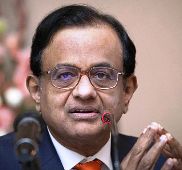 Concerned over delay in implementation of projects, Finance Minister P Chidambaram suggested on Saturday setting of a National Investment Board under Prime Minister to accord speedy clearances to mega proposals.
Concerned over delay in implementation of projects, Finance Minister P Chidambaram suggested on Saturday setting of a National Investment Board under Prime Minister to accord speedy clearances to mega proposals.
"The NIB's authority should extend to proposals/projects where the investment is above a certain threshold, say, Rs 1,000 crore (Rs 10 billion).
Once the final decision is taken by the NIB, no other Ministry or Department or Authority should be able to interfere with that decision or delay its implementation," he said during his intervention at the meeting of the full Planning Commission.
Chidambaram regretted that under the present dispensation, 'a truly final decision' (on projects) does not emerge for many years".
He said outlays in the 11th Five Plan felt short of targets mainly because of failure to achieve physical targets.
Giving illustrations, the Minister pointed out that addition in power generation capacity during the Plan period was 55,000 MW as against the target of 78,700 MW.
Similar shortfalls were witnessed in other key sectors like coal, crude oil, gas and railways.
To overcome these problems, Chidambaram said: "I would . . . urge that we seriously consider the need to set up a mechanism at the Cabinet level to take final decisions on major investment proposals, especially in the infrastructure sector.
"The authority to take the final decision/decisions should be vested in a NIB to be chaired by the Prime Minister and the Allocation of Business Rules should be amended to create such a mechanism", he added.
At present, the Business Rules allocate the authority to take the final decision to one or more ministries.
The outcomes, Chidambaram said, "must be measured not only in terms of achieving the financial outlays but also achieving the physical targets. The main reason why actual growth rate in each Plan period was less than the targeted growth rate was the failure to achieve physical targets".
Referring to the 8.2 per cent growth target in the 12th Five Year Plan (2012-17), he said, it was 'realistic' given the fact the Gross Domestic Product grew by 7.6 per cent in the 10th Plan and 7.9 per cent in the 11th Plan.
The minister, however, described the 12th Plan's proposal to reduce subsidy from 1.9 per cent of GDP in the budget estimates of 2012-13 to 1.2 per cent in 2016-17 as 'over-optimistic'.
According to the minister, 'the estimated major subsidies in 2012-13 would be around 2.4 per cent of GDP, and a sharp fall as assumed in the Plan may be over-optimistic.'
Direct cash transfer of subsidies in food, fertilisers and petroleum will help in this reduction.
"I would urge that by the end of the 12th Plan, these three major subsidies be rolled out across the country through direct cash transfers to the beneficiaries. Pilot projects are already under implementation for LPG and kerosene and it is our intention to extend the direct transfer mechanism to the UTs in the first phase," he added.
On the investment side, the Minister said, the gross budgetary support during the entire 12th Plan period has been estimated at Rs 35.68 lakh crore (Rs 35.68 trillion) which works out to 5.23 per cent of GDP over the 5 year period.
The GBS realised over the 11th Plan period was only 4.69 per cent of GDP, he said, adding 'the assumptions of tax to GDP ratio seem to be highly optimistic'.
The Internal and Extra Budgetary Resources of the central PSUs has been estimated at Rs 20.59 lakh crore (Rs 20.59 trillion) making the total resources available for the Central Plan at Rs 47.70 lakh crore (Rs 47.7 trillion).
Higher IEBR, he added, 'would be required to meet the shortfall, if any, in the GBS'.
Referring to the Centrally Sponsored Schemes, Chidambaram said, out of the 147 schemes currently in operation, 100 schemes have an outlay of less than Rs 300 crore (Rs 3 billion) each for the whole country.
"Given the cost of administering the schemes and the capacity now available within the States, these deserve to be closed at the level of the Central Government", he said.
Chidambaram said the allocated funds could be added to the normal central assistance of the respective states to enable them implement these schemes.
Image: P Chidambaram









 © 2025
© 2025